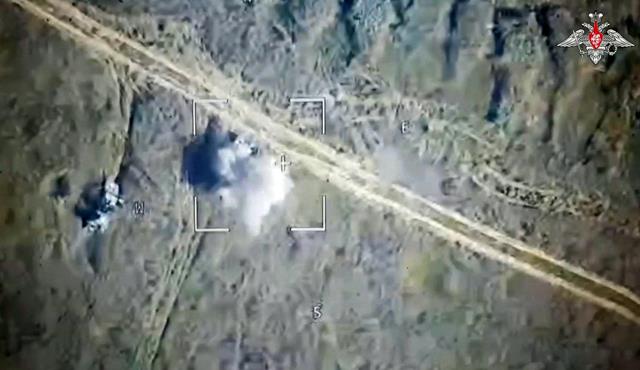
Thousands Evacuated As Russia Battles Major Ukrainian Border Incursion
A local state of emergency was introduced in Russia's Kursk region on Wednesday evening, 36 hours after Ukrainian soldiers, tanks and armoured vehicles stormed into the western border region.
Russia said it launched air and artillery firepower to repel the attack throughout Wednesday, after having rushed reinforcements to the region in a bid to halt Ukrainian advances.
After two days of fighting, both the extent of the damage and the depth of the Ukrainian advance into Russian territory was unclear -- though several reports from both Ukrainian and Russian military bloggers suggested the fighters had gained several kilometres.
President Vladimir Putin said Ukraine had attacked civilian buildings while Russia's top general vowed to crush the incursion.
"The Kyiv regime has undertaken another large-scale provocation," Putin said in a televised meeting with government officials.
"It is firing indiscriminately from various types of weapons, including rockets, at civilian buildings, residential houses and ambulances," he added.
Kursk Governor Alexei Smirnov introduced a localised state of emergency in the region on Wednesday evening, a move that gives authorities additional powers to bring the situation under control.
At least five civilians have been killed and 31 wounded since the incursion began, Russian health officials said Wednesday.
Senior Ukrainian officials have not commented directly on the attack.
'Not everyone can leave'
Authorities in Ukraine's northeastern Sumy region, just across the border from Kursk, announced they were evacuating about 6,000 people, without elaborating.
Several thousand were also evacuated from the Kursk region.
Some Russian military bloggers were reporting Ukrainian troops had reached the town of Sudzha, some eight kilometres (five miles) from the border, and were shelling it constantly.
The small town of about 5,000 people is home to the Sudzha metering station, the last major transit point for Russian pipeline gas still heading to Europe via Ukraine.
A priest in the town, Evgeny Shestopalov, said in a video shared by Russian media that Sudzha was "on fire" and that residents unable to evacuate were sheltering at his church.
"Our church is full of people, children. Not everyone has shelters, not everyone can leave," he said.
A local Russian TV station broadcast images from the centre of the city showing destroyed buildings, debris strewn across the street and large craters in the ground from artillery hits.
Russia's National Guard said it was strengthening defences at the Kursk nuclear power station, some 60 kilometres from the border with Ukraine.
The Chief of Russia's General Staff, Valery Gerasimov, said up 1,000 combatants from Ukraine had been involved in the offensive, and that Russian forces had stopped them penetrating deeper into the Kursk region.
"The operation will end with the enemy's defeat and them being pushed back to the state border," he told Putin in a televised meeting.
'More pressure'
Ukraine has not claimed responsibility for the incursion, the most serious cross-border attack in months.
President Volodymyr Zelensky on Wednesday thanked Ukrainian troops for their "bravery" in an evening address published on social media.
"The more pressure we put on Russia ... the closer we will get to peace. A just peace through just force," he said, without making any specific reference to the fighting in Kursk.
A security source in Ukraine told AFP that Kyiv had struck a Russian helicopter using a drone on Tuesday over the Kursk region, but did not explicitly link it to the incursion.
Ukrainian presidential aide Mykhailo Podolyak also alluded to the attacks. Moscow had used its "border regions with impunity for massive air and artillery attacks", he said on social media.
Fighters from Ukraine have made several brief incursions into Russia before, some by units of Russians fighting in support of Kyiv -- the Russian Volunteer Corps and the Freedom of Russia Legion.
Putin in May launched a major new offensive into northeast Ukraine in a bid to create what he called a security buffer to protect Russian border regions.
That offensive was focused on Ukraine's Kharkiv region, to the southeast of the Sumy region, from where Tuesday's cross-border raid was mounted.
However the attacks on Russian territory have continued, with Russia's Belgorod region declaring more than a dozen villages near the border no-go zones due to bombardment in July.
Ukraine has repeatedly said it sees attacks on military and energy infrastructure inside Russian territory as a justified response to Moscow's full-scale military offensive.

Legal Disclaimer:
MENAFN provides the
information “as is” without warranty of any kind. We do not accept
any responsibility or liability for the accuracy, content, images,
videos, licenses, completeness, legality, or reliability of the information
contained in this article. If you have any complaints or copyright
issues related to this article, kindly contact the provider above.

















Comments
No comment